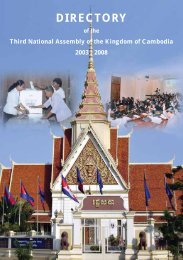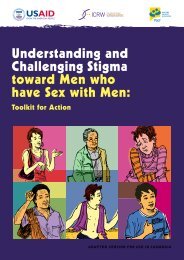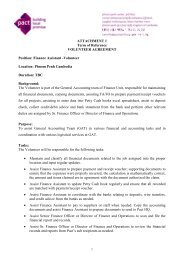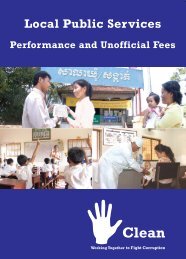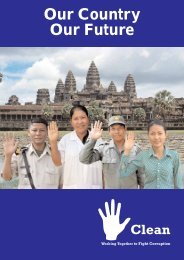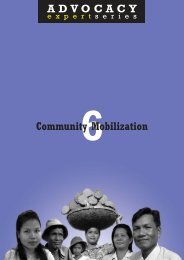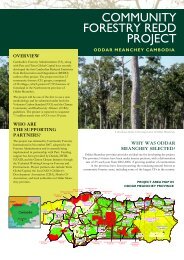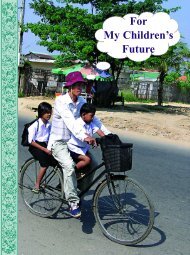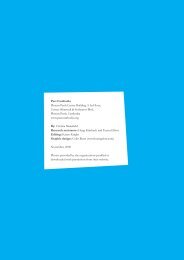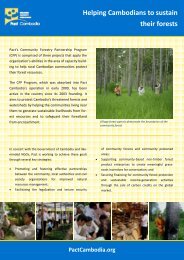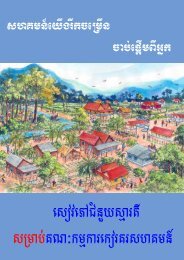Advocacy in Cambodia: Increasing Democratic ... - Pact Cambodia
Advocacy in Cambodia: Increasing Democratic ... - Pact Cambodia
Advocacy in Cambodia: Increasing Democratic ... - Pact Cambodia
Create successful ePaper yourself
Turn your PDF publications into a flip-book with our unique Google optimized e-Paper software.
Increas<strong>in</strong>g <strong>Democratic</strong> Space<br />
better understand<strong>in</strong>g of fisheries conflicts. As the<br />
field trip lasted four days, NGO staff had ample<br />
opportunity to establish good relations with the<br />
journalists.<br />
Dissem<strong>in</strong>at<strong>in</strong>g Reliable Information<br />
<strong>Advocacy</strong> campaigns depend to a great extent<br />
on credible sources dissem<strong>in</strong>at<strong>in</strong>g reliable<br />
<strong>in</strong>formation <strong>in</strong> order to change exist<strong>in</strong>g public<br />
perceptions about a problem. Information needs<br />
to be collected before it can be dissem<strong>in</strong>ated<br />
however, and given their l<strong>in</strong>ks to grassroots<br />
communities and extensive<br />
networks, civil society<br />
organizations are well<br />
While use of the media<br />
as an advocacy<br />
strategy is grow<strong>in</strong>g,<br />
very few of the<br />
organizations and<br />
networks <strong>in</strong>terviewed<br />
have developed a<br />
genu<strong>in</strong>e media strategy<br />
that <strong>in</strong>cludes regular<br />
contact with the press.<br />
placed to learn about<br />
problems and collect<br />
<strong>in</strong>formation that other<br />
actors may not be <strong>in</strong> a<br />
position to collect.<br />
As mentioned<br />
previously, surveys<br />
conducted by women’s<br />
organizations s<strong>in</strong>ce the<br />
mid-1990s have been<br />
critical <strong>in</strong> publiciz<strong>in</strong>g the<br />
country’s domestic<br />
violence problem. More<br />
recently, the publication Feast or Fam<strong>in</strong>e,<br />
prepared by a consortium of fisheries advocates,<br />
articulates difficult fisheries management<br />
problems that <strong>Cambodia</strong> is currently<br />
experienc<strong>in</strong>g, and provides compell<strong>in</strong>g arguments<br />
for change <strong>in</strong> the fisheries sector. These types of<br />
high quality research publications, however,<br />
cont<strong>in</strong>ue to be relatively rare.<br />
As elsewhere <strong>in</strong> the world, the Internet<br />
cont<strong>in</strong>ues to ga<strong>in</strong> significance and presents an<br />
important avenue for dissem<strong>in</strong>at<strong>in</strong>g <strong>in</strong>formation.<br />
The Documentation Center of <strong>Cambodia</strong> has an<br />
excellent webpage, as does the NGO Forum on<br />
<strong>Cambodia</strong>. These webpages tend to be used mostly<br />
by readers abroad however, who are seek<strong>in</strong>g<br />
<strong>in</strong>formation about <strong>Cambodia</strong>. With<strong>in</strong> the country,<br />
limited access to computers and low speed<br />
connections limit the usefulness of this strategy.<br />
Analysis of Media Activities<br />
Use of the media as an advocacy strategy <strong>in</strong><br />
<strong>Cambodia</strong> is considerably limited by the current<br />
state of the media <strong>in</strong>dustry itself. The objectivity<br />
of the local pr<strong>in</strong>ted press is generally put <strong>in</strong><br />
question, although various tra<strong>in</strong><strong>in</strong>g programs have<br />
worked or are currently work<strong>in</strong>g to <strong>in</strong>crease<br />
reporters’ skills and promote a culture of report<strong>in</strong>g<br />
ethics. Other obstacles <strong>in</strong>clude the limited literacy<br />
of the majority of the population, which does not<br />
have the luxury of demand<strong>in</strong>g better performance<br />
from the press, as well as a scarcity of advertis<strong>in</strong>g<br />
revenue. F<strong>in</strong>ally, because of the limited <strong>in</strong>terest<br />
and capacity of the pr<strong>in</strong>t and broadcast media,<br />
most media messages related to advocacy<br />
campaigns tend to be self-produced (i.e. HIV<br />
advocates write HIV messages).<br />
While use of the media as an advocacy<br />
strategy is grow<strong>in</strong>g, very few of the organizations<br />
and networks <strong>in</strong>terviewed have developed a<br />
genu<strong>in</strong>e media strategy that <strong>in</strong>cludes regular<br />
contact with the press. Exceptions <strong>in</strong>clude the<br />
NGO Forum and COMFREL. In these cases,<br />
expatriate technical assistance has played a role<br />
<strong>in</strong> build<strong>in</strong>g this capacity. In the case of COMFREL,<br />
the Asia Foundation provided a media advisor<br />
dur<strong>in</strong>g the election period, while the NGO Forum<br />
had an <strong>in</strong>formation advisor on staff for a number<br />
of years.<br />
Although the dissem<strong>in</strong>ation of <strong>in</strong>formation<br />
for policy purposes rema<strong>in</strong>s limited, civil society<br />
organizations are learn<strong>in</strong>g to use the media for<br />
public education purposes. For example, the<br />
Women’s Media Center has acquired the capacity<br />
to develop media messages that are very effective<br />
<strong>in</strong> target<strong>in</strong>g grassroots audiences.<br />
Use of the media to draw attention to a<br />
problem and restra<strong>in</strong> government (or other)<br />
action – as <strong>in</strong> the case of the child care center built<br />
overnight <strong>in</strong> a squatter area – cont<strong>in</strong>ues to be<br />
limited to urban areas for two ma<strong>in</strong> reasons. First,<br />
it is only <strong>in</strong> urban areas that a sufficient number<br />
of people’s attention can be drawn to a situation<br />
that then makes actors reluctant to take<br />
controversial action. Second, advocates likely feel<br />
safer us<strong>in</strong>g this k<strong>in</strong>d of strategy <strong>in</strong> urban areas than<br />
<strong>in</strong> rural areas, where they are less protected.<br />
Because it is a popular form of enterta<strong>in</strong>ment<br />
(particularly <strong>in</strong> rural areas), radio broadcasts<br />
appear to be gett<strong>in</strong>g more attention from<br />
advocates. A number of NGOs have broadcast<br />
messages on Radio Free Asia, for example.<br />
For now, the majority of media advocacy<br />
targets the foreign language press, but not<br />
necessarily the local language press. A major<br />
reason cited for avoidance of the Khmer press is<br />
the fee that NGOs are charged <strong>in</strong> order to get their<br />
stories pr<strong>in</strong>ted. For example, one prov<strong>in</strong>cial NGO<br />
stated that it is reluctant to approach reporters<br />
from Khmer language papers because those<br />
reporters usually charge $5 to publish articles.<br />
Furthermore, when articles are critical of<br />
prov<strong>in</strong>cial public officials, reporters sometimes<br />
suppress the articles <strong>in</strong> exchange for<br />
compensation from the official. Sadly, as long as<br />
newspapers f<strong>in</strong>d themselves with limited<br />
advertis<strong>in</strong>g revenue, this situation is unlikely to<br />
change.<br />
40



